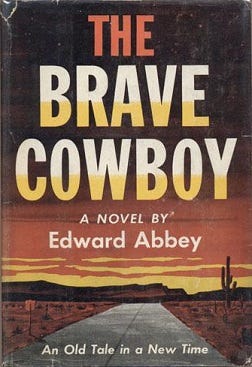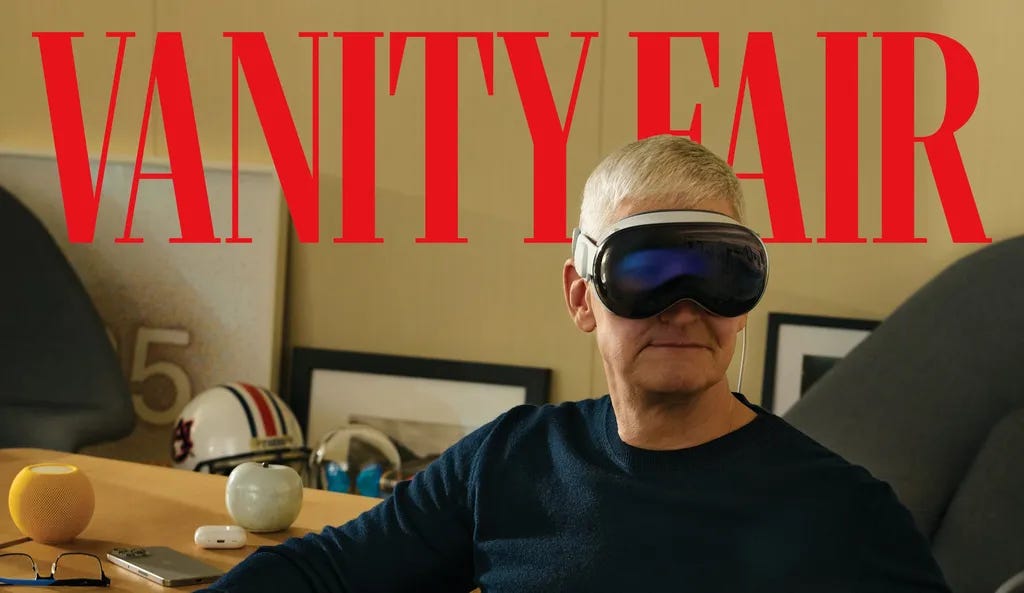“Jack . . .” She stepped forward and touched his shoulder and he faced her again, waiting. “Kiss me,” she said.
“I want to,” he said. But he made no move. “I want to.”
“What are you afraid of?”
“I don’t know. Nothin, I guess.” He reached out then and embraced her and kissed her gently and quickly on the lips.
“What I’m afraid of,” he said slowly, “is me. That’s all.”
“We’re both afraid of the same thing, then,” she said.
“Maybe everybody is.”
An Old Tale in a New Time
This passage comes from Edward Abbey’s 1956 novel The Brave Cowboy, which I recently read for the first time. Placed in the early 20th-century American Southwest, it’s the story of Jack Burns, a horse-riding, sheep-herding, desert-wandering nomad who feels at odds with modern society. After failing to break a friend free from prison, Jack finds himself and his horse, Whiskey, pursued by law enforcement across the desert and the mountains toward Mexico.
In many ways, Burns fits the classic literary profile of a cowboy—solitary, unsophisticated, assured. He’s your typical man of action, possessed of a deep moral code but rarely hamstrung by too much deliberation. The protagonist cowboys of early Westerns were almost always depicted as lone-heroes, beacons of civility on a wild frontier, enforcers of justice, if vigilante justice. As the genre evolved, though, the clean lines between right and wrong grew increasingly vague. Western noirs gave us cowardly cowboys, anti-heroes, and villains you almost want to root for. (Everybody knows Anton Chigurh is the most interesting character in No Country for Old Men, for example, even if he is a psychopath.)
Jack Burns is the “brave” cowboy not because he duels with villains in the name of law and order but because he stands against the confines of modernity. He prefers to live off the grid. He rejects most new technology (e.g., automobiles), goes without standard forms of identification, and declines to register for the draft, all of which earns him the epithet “anarchist cowboy” by the police. The entire novel is a juxtaposition between rival views of human flourishing and society. As the subtitle puts it, Burns himself is “an old tale in a new time.”
“What are you afraid of?”
Back to the dialogue above. The scene appears at a pivotal point in the story, just after Burns has escaped from prison, though failing to rescue his friend. He knows the police will be close behind. Nevertheless, before leaving town he stops by the house of Jerry Bondi, to say farewell. Jerry is an old friend who clearly has affections for Burns, but she’s not about to uproot her life to follow the Cowboy into the wilderness. It’s a classic, tragic goodbye, ending, of course, with Burns riding off into the sun. What strikes me as unique, however, is why Burns says he can’t stay.
When Jerry asks, “What are you afraid of?” she’s not only referencing the kiss or the impossibility of their love; she’s asking why Burns refuses a normal, domestic life (which women often symbolize in these stories, you know). We might expect him to blame the corrupt guards who recently beat him; government bureaucracy; the Selective Service System; or just the deadening effects of life spent in a concrete jungle. Instead, he offers this confession:
“What I’m afraid of … is me. That’s all.”
Self-doubt? Not exactly a virtue among cowboys. And yet, as I’ve reflected on this passage, I’ve found something courageous in Burns’s confession. Perhaps he cannot accept life on society’s terms because he knows it would bring out the worst of him. He fears what he might become, were he to stay. Indeed, having spent the last several nights in prison, he has witnessed the savageries to which men fall victim when deprived of their freedom (in the case of the inmates) or when granted too much of it (in the case of the guards). No man can resist the dehumanizing force of the prison, and the prison is, for Abbey and for Burns, a metaphor for society.
Philosophers have long debated whether society corrupts man or man corrupts society or some mix of the two. Jean-Jacques Rousseau imagined humanity as pure and amiable in a “state of nature,” which society then shackled and corrupted. Thomas Hobbes, on the other hand, infamously described our natural condition as “solitary, poor, nasty, brutish, and short,” requiring the intervention of a state sovereign to curb violence and protect individual rights. Are humans basically good or bad? Our views of politics, society, and culture (not to mention religion and morality) turn on this question.
Consider the following passage from Badger Clark’s poem “A Cowboy’s Prayer,” in which the speaker seems to resonate with Jack Burns:
Let me be easy on the man that's down;
Let me be square and generous with all.
I'm careless sometimes, Lord, when I'm in town,
But never let 'em say I'm mean or small!
Make me as big and open as the plains,
As honest as the hawse between my knees,
Clean as the wind that blows behind the rains,
Free as the hawk that circles down the breeze!
In his petition for a more generous spirit, the Cowboy admits he gets “careless sometimes” when he’s “in town.” Maybe he squanders his paycheck at the casino, or gets into brawls at the saloon, or covets his neighbor’s pack mule. Whatever the case, something about the conditions of town elicits careless behavior from the Cowboy, and he knows it. Hence the contrasting turn to the natural world in the next stanza, where he finds similes of virtue in the openness of the plains, the honesty of his “hawse,” the purity of the wind, and the freedom of a hawk.
True, Clark’s poem is a bit rosy—the hawk was probably hunting for field mice to devour—but his speaker also demonstrates a degree of realistic self-doubt. Like Burns, he knows his weaknesses. He must get out of town to overcome them, and pray.
Know Thy Demons
Here’s my point. We all have our peculiar flaws, demons, dark aspects of ourselves we would do well to distrust. When Jerry tells Burns to kiss her, he admits, twice, that he would like to. And when he eventually does, he suddenly remembers: what I’m afraid of … is me. What I didn’t mention above is that Jerry is also married to Burns’s best friend, the very friend he has just failed to rescue from prison. The Cowboy has plenty to fear in that moment, himself most of all.
There is no shortage of terrifying problems in society, “out there.” Take digital technology. Many people are now awakening to the physical, moral, and psycho-social casualties of too much screen time. Countless studies have been published on the drawbacks of social media. More and more “users” are rethinking their relationships to major platforms, while others are opting out altogether. We love to blame Big Tech for our woes—the algorithm made me do it! And insofar as digital tools are engineered for addiction or other forms of manipulation, this critique holds. But it’s not the whole story.
The whole story would account for the fact that each of us engages with social media and the internet and reality itself as a particular tangle of proclivities and disordered loves. Of these we must be, if not afraid, acutely aware. Only then can we begin to realize which tools, apps, sites, accounts, or practices are most likely to exploit our weaknesses. I once heard Paul Kingsnorth say that he does not allow himself a Twitter account for fear of going mad. This was both an indictment of Twitter and an acknowledgement of his personal limits. Big Tech is not neutral. Neither are we.
I wanted to end this essay by noting parallels between Jack Burns and those early Christian monastics who fled the Roman Empire, after Constantine legalized Christianity in 313 AD, to pursue a more rigorous form of spirituality in the desert. Because… why not! Instead, I’ll just suggest you pick up the novel and see what you think.
But my mind keeps turning to those Desert Fathers, those brave pilgrims. I’m sure at least one of them hoped he was escaping his problems by joining a monastic community in the desert, only to discover that his damned demons followed him out there. He thought his faith was growing cold in the city, so commonplace had Christianity become, only to be tested as never before in the scorching heat of the sun. Eventually he realized: that was the point.






